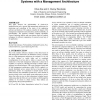Free Online Productivity Tools
i2Speak
i2Symbol
i2OCR
iTex2Img
iWeb2Print
iWeb2Shot
i2Type
iPdf2Split
iPdf2Merge
i2Bopomofo
i2Arabic
i2Style
i2Image
i2PDF
iLatex2Rtf
Sci2ools
158
Voted
WOSP
2004
ACM
2004
ACM
Computing the performability of layered distributed systems with a management architecture
This paper analyzes the performability of client-server applications that use a separate fault management architecture for monitoring and controlling of the status of the application software and hardware. The analysis considers the impact of the management components and connections, and their reliability, on performability. The approach combines minpath algorithms, Layered Queueing analysis and non-coherent fault tree analysis techniques for efficient computation of expected reward rate of the application. Keywords System Fault-tolerance, Performability, Distributed Systems, Noncoherent fault trees, Layered Queueing Networks.
Related Content
| Added | 30 Jun 2010 |
| Updated | 30 Jun 2010 |
| Type | Conference |
| Year | 2004 |
| Where | WOSP |
| Authors | Olivia Das, C. Murray Woodside |
Comments (0)

